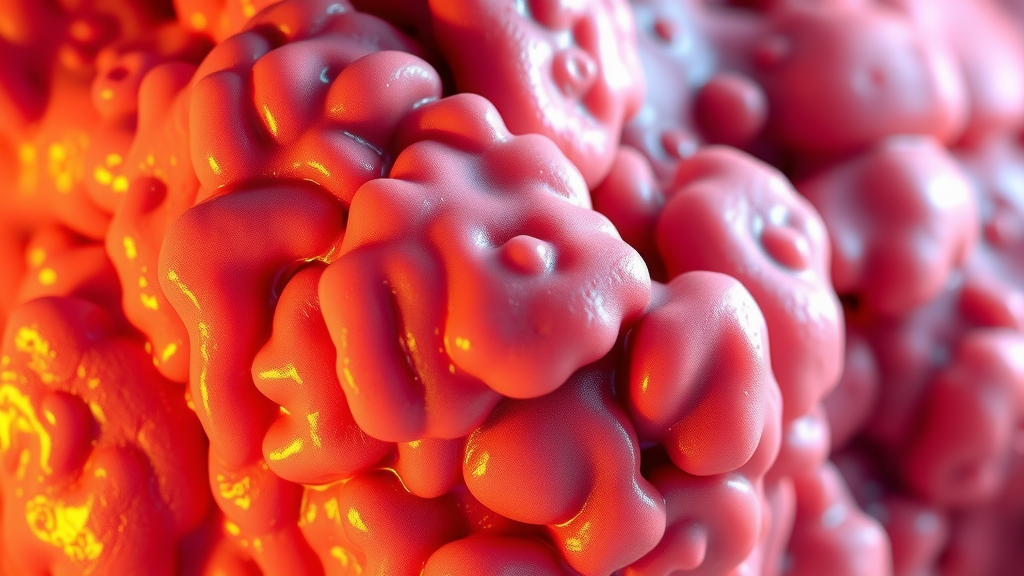
Emerging evidence reveals that the body’s chronic inflammation may significantly contribute to mental health challenges, particularly major depressive disorder. A growing number of studies indicate that addressing inflammation could enhance emotional well-being.
Could managing inflammation be the key to improving your mental health? As research progresses, understanding how inflammation affects mood becomes essential for developing effective strategies for relief.
‘Click here to learn more about:’ the ultimate anti inflammatory guide
The Connection Between Inflammation and Mental Health
Recent findings indicate that inflammatory cytokines, such as Interleukin 6 and Tumor Necrosis Factor, can disrupt brain function and emotional regulation.
Notable data suggests that elevated inflammatory markers correlate with increased rates of major depressive disorder.
A pivotal 2015 study in *JAMA Psychiatry* established a significant association between high levels of inflammatory markers and the onset of depressive episodes. This evidence highlights the potential role of inflammation in both the pathophysiology and symptomatology of depression.
Chronic inflammation can manifest as prolonged fatigue, joint pain, and mood swings.
How Inflammation Influences Mental Health
Chronic inflammation may cause a variety of changes in the brain that can lead to depressive symptoms.
Specific mechanisms include:.
- Disruption of neurotransmitter function, particularly serotonin, which plays a critical role in mood regulation.
- Alteration of neuroplasticity, impacting the brain’s ability to adapt and recover from emotional stress.
- Increased oxidative stress, which can further exacerbate inflammation and emotional dysregulation.
Solutions to Combat Chronic Inflammation and Depression
Addressing inflammation through several lifestyle modifications may alleviate depressive symptoms and enhance overall mental well-being:.
- Adopt an anti-inflammatory diet: Incorporate fruits, vegetables, and omega-3 fatty acids to reduce inflammation.
- Engage in regular physical activity: Exercise is proven to lower inflammatory markers and boost mood.
- Practice mindfulness: Techniques like meditation and yoga help reduce stress levels.
- Ensure adequate sleep: Quality sleep supports immune function and emotional health.
- Consider natural supplements: Products such as curcumin and omega-3s have anti-inflammatory properties.
- Limit processed foods: Reducing refined sugars and trans fats is beneficial for inflammation control.
- Seek professional help: Therapy or counseling focused on emotional health can provide significant support.
- Avoid smoking and excessive alcohol consumption: These factors can increase inflammation levels.
- Incorporate herbs and spices: Anti-inflammatory ingredients like ginger and turmeric can easily be added to meals.
- Build a support system: Engage family, friends, and health professionals to promote emotional wellness.
Taking proactive steps may lead to notable improvements in both mental and physical health. Individual responses vary, and seeking professional guidance ensures that chosen solutions are safe and effective.

Exploring The Connection Between Inflammation And Mood Disorders
Chronic inflammation is increasingly recognized as a significant contributor to various mood disorders, particularly major depressive disorder and anxiety. Research illustrates that individuals exhibiting elevated levels of inflammatory markers, such as C-reactive protein (CRP), frequently report mood fluctuations and emotional dysregulation.
Notably, case studies have demonstrated that anti-inflammatory treatments can lead to substantial improvements in depressive symptoms.
Increasing evidence suggests that addressing systemic inflammation may present novel strategies for enhancing mental health.
The relationship between inflammation and mood disorders encompasses a range of biological and psychological factors. Inflammation may shape neurotransmitter function, which is crucial for mood regulation.
Exploring these connections provides insights into potential therapeutic interventions for improving overall emotional well-being.
The Role Of Cytokines In Depression
A selection of key cytokines has been identified as playing a significant role in the development of depression, particularly through their effects on neurotransmitter systems.
The following cytokines are notable for their impact:
- Interleukin-6 (IL-6) – Frequently elevated in patients with major depressive disorder, IL-6 disrupts serotonin balance and may exacerbate depressive symptoms.
- Tumor Necrosis Factor-alpha (TNF-α) – Linked to increased depressive symptoms, TNF-α influences neuronal function and also contributes to inflammation.
- Interferon-gamma (IFN-γ) – Known for inducing inflammation, IFN-γ can precipitate mood disturbances and has connections to both depression and immune responses.
By focusing on these cytokines, researchers are uncovering potential therapeutic targets for mitigating depressive symptoms and enhancing mental health outcomes.
Chronic Inflammation and Depression Solutions
An overview of effective strategies to address chronic inflammation reveals promising avenues for alleviating depressive symptoms:
- Adopt an anti-inflammatory diet rich in fruits, vegetables, and omega-3 fatty acids.
- Engage in regular physical activity to reduce inflammation and improve mood.
- Practice mindfulness techniques such as meditation and yoga to lower stress levels.
- Ensure adequate sleep to support immune function and emotional well-being.
- Consider natural supplements like curcumin and omega-3s, which may help reduce inflammation.
- Limit intake of processed foods, refined sugars, and trans fats that can exacerbate inflammation.
- Seek professional therapy or counseling focused on emotional health.
- Avoid smoking and excessive alcohol consumption, which may increase inflammation.
- Incorporate anti-inflammatory herbs and spices, such as ginger and turmeric, into daily meals.
- Build a support system involving family, friends, and health professionals for enhanced emotional wellness.
Chronic inflammation can manifest as prolonged fatigue, joint pain, and mood swings. Studies indicate a bidirectional relationship, where depression may worsen inflammation. Implementing nutritional and lifestyle changes can yield improvements in both physical and mental health.
As chronic inflammation continues to be explored in relation to mental health, these actionable strategies offer hope for individuals seeking to enhance their emotional resilience and overall well-being.
| Cytokine | Impact on Mood Disorders |
|---|---|
| Interleukin-6 (IL-6) | Disrupts serotonin balance, exacerbating depressive symptoms. |
| Tumor Necrosis Factor-alpha (TNF-α) | Linked to increased depressive symptoms and influences neuronal function. |
| Interferon-gamma (IFN-γ) | Induces inflammation, precipitating mood disturbances. |
| Chronic Inflammation | Can worsen depression and manifest as fatigue and mood swings. |
How Chronic Inflammation Affects Emotional Wellbeing
Chronic inflammation impacts emotional health in profound ways, influencing mood stability over extended periods. Research indicates that persistent inflammation, characterized by heightened levels of inflammatory cytokines such as Interleukin 6 and Tumor necrosis factor, disrupts neurotransmitter systems, particularly serotonin, which is critical for mood regulation.
Consequently, individuals often experience depressive symptoms that contribute to a feedback loop, exacerbating both inflammation and mood disorders.
“The connection between chronic inflammation and depression is increasingly recognized in scientific literature. ”
In addition to mood disturbances, people may face increased fatigue and irritability, which further compounds feelings of hopelessness linked to chronic pain.
The relationship between chronic inflammation and emotional dysregulation necessitates a focused approach to improve mental health outcomes.
Long-Term Effects on Mood Stability
Chronic inflammation can lead to sustained emotional dysregulation, with studies suggesting that the inflammatory response may play a role in the development of various mental disorders, including major depressive disorder and anxiety.
Understanding these dynamics is essential for addressing the emotional challenges tied to chronic health conditions.
Targeting Inflammatory Markers For Better Mental Health
Identifying specific inflammatory markers is imperative for effectively addressing mental health issues. Key markers, including C-reactive protein and a variety of cytokines, can be evaluated through routine blood tests to assess an individual’s inflammatory status.
Elevated levels of these markers often correlate with increased severity of major depressive disorder.
Methods for Measurement and Intervention
- Anti-inflammatory diet: Incorporating foods rich in fruits, vegetables, and omega-3 fatty acids can lower inflammation.
- Regular exercise: Engaging in physical activity helps reduce inflammation while boosting mood.
- Mindfulness practices: Techniques such as meditation and yoga foster stress reduction.
- Adequate sleep: Quality rest supports immune function and emotional health.
- Natural supplements: Substances like curcumin and omega-3s display anti-inflammatory effects.
- Limit processed foods: Reducing intake of refined sugars and trans fats can mitigate inflammation.
- Professional support: Seeking therapy or counseling can focus on enhancing emotional health.
- Avoid harmful habits: Not smoking and reducing alcohol consumption can decrease levels of systemic inflammation.
“Building a support network is fundamental for promoting emotional wellness. ”
Effective strategies targeting inflammatory markers can pave the way for improved mental health. Individual responses to dietary changes can vary, making personalization in treatment essential. Incorporating manageable lifestyle changes often leads to better long-term habits.
Chronic Inflammation and Emotional Wellbeing
- Chronic inflammation is linked to increased levels of inflammatory cytokines, which disrupt serotonin levels and can lead to depressive symptoms.
- Studies indicate that chronic inflammation may contribute to the development of mental disorders such as major depressive disorder and anxiety.
- Routine blood tests measuring inflammatory markers like C-reactive protein can help assess the severity of mental health issues.
- Implementing lifestyle changes such as an anti-inflammatory diet and regular exercise can significantly improve emotional health outcomes.
Strategies To Reduce Inflammation And Improve Mood
Dietary choices play a significant role in influencing inflammation levels and can markedly enhance mood. An anti-inflammatory diet should prioritize whole foods, including a wide variety of fruits, vegetables, and whole grains.
Notably, integrating omega-3 fatty acids from sources such as fatty fish, flaxseeds, and walnuts is essential for mitigating inflammatory markers.
Regular physical activity is also important; it not only reduces systemic inflammation but also releases endorphins, which uplift mood and support emotional stability.
Mindfulness practices such as yoga and meditation contribute to stress reduction, which further aids in decreasing inflammation. By implementing these lifestyle changes, individuals can cultivate a healthier mindset and effectively manage chronic inflammation.
Key Components of an Anti-Inflammatory Diet
- Fruits and Vegetables: Aim for a rainbow of colors to maximize nutrients.
- Omega-3 Sources: Include fatty fish like salmon, walnuts, and flaxseeds.
- Whole Grains: Opt for quinoa, brown rice, and whole wheat products.
Exercise and Mindfulness
Engaging in regular exercise not only combats inflammation but also acts as a natural mood booster. Practices such as yoga and meditation have been shown to lower stress levels, thus reducing inflammation. These lifestyle adjustments not only foster emotional health but also contribute to overall well-being.
The Interplay Between Inflammation And Anxiety
Examining the relationship between inflammation and anxiety disorders offers valuable insights into managing mental health. Research indicates that elevated levels of inflammatory cytokines can disrupt neurotransmitter systems, increasing the risk of anxiety disorders. Chronic anxiety, in a reciprocal manner, activates the stress response, leading to further inflammation, resulting in a detrimental cycle. This bidirectional relationship necessitates a comprehensive approach to treatment that incorporates anti-inflammatory dietary practices, regular exercise, and mindfulness routines.
Impact of Inflammation on Neurotransmitters
Chronic inflammation may lead to alterations in neurotransmitter function, particularly affecting serotonin levels which are linked to mood regulation. Embracing an anti-inflammatory diet can be beneficial in restoring balance.
Therapeutic Approaches
Integrating therapies that target both anxiety and inflammation can significantly mitigate the impact of these interrelated conditions.
- Mindfulness Practices: Techniques such as meditation and yoga can assist in stress reduction.
- Regular Exercise: Proven to decrease inflammation markers and improve overall mood.
- Nutritional Adjustments: Emphasize a diet rich in anti-inflammatory foods.
Addressing mental health from a holistic perspective promotes emotional stability while also diminishing inflammatory responses in the body.
Inflammation and Mood
- Studies show that a diet rich in omega-3 fatty acids can lower inflammatory markers and improve mood stability.
- Regular physical activity is linked to the release of endorphins, which can enhance mood and reduce inflammation.
- Mindfulness practices like yoga and meditation have been proven to decrease stress levels, contributing to lower inflammation.
- Research indicates that chronic inflammation can disrupt neurotransmitter systems, increasing the risk of anxiety disorders.
Clinical Insights On Inflammation In Depression
Recent clinical trials reveal a significant connection between inflammation and major depressive disorder. Evidence indicates that patients diagnosed with major depressive disorder frequently exhibit elevated levels of inflammatory markers, including Interleukin 6 and Tumor necrosis factor.
These findings imply that inflammation may play a key role in the pathophysiology of depression, positioning it as a potential therapeutic target.
Studies suggest that ameliorating inflammation can lead to noticeable improvements in depressive symptoms, ultimately fostering better emotional dysregulation.
Therefore, mental health professionals are encouraged to take into account inflammatory biomarkers when evaluating patients, as this could enhance treatment effectiveness and overall health outcomes.
Anti Inflammatory Treatments For Mood Disorders
Exploring effective treatments for inflammation in mood disorders involves a combination of pharmacological and non-pharmacological strategies. Here are some key areas of focus:
Pharmacological Treatments
Certain anti-inflammatory medications and antidepressants have demonstrated effectiveness in alleviating depressive symptoms tied to inflammatory conditions.
These treatments target inflammatory pathways that may contribute to mood disorders.
Dietary Approaches
Anti-inflammatory diets rich in fruits, vegetables, and omega-3 fatty acids play a significant role in managing inflammation. Consulting with a nutritionist can help patients develop meal plans that incorporate:
- Fresh fruits and vegetables
- Whole grains
- Healthy fats, such as those found in fish and nuts
- Natural spices like turmeric and ginger
Physical Activity and Mindfulness
Engaging in regular physical activity has been shown to reduce inflammation and boost mood. Including practices such as yoga and meditation can significantly lower stress levels, further mitigating inflammatory responses.
Natural Supplements
Natural supplements, like curcumin and omega-3s, have been shown to possess anti-inflammatory properties. These can be incorporated into daily routines in consultation with healthcare providers.
Additional Lifestyle Modifications
Incorporating healthy lifestyle changes can also contribute to managing inflammation. Consider:
- Limiting processed foods and refined sugars
- Avoiding smoking and excessive alcohol consumption
- Ensuring adequate sleep to support immune function
- Building a support system of friends, family, and health professionals for emotional wellness
Chronic inflammation can result in prolonged fatigue, joint pain, and mood swings. Addressing these through dietary changes, regular exercise, and appropriate therapies can significantly improve overall mental health.
Overall, integrating anti-inflammatory strategies into treatment regimens may provide holistic benefits for individuals grappling with depression.
| Focus Area | Supporting Evidence |
|---|---|
| Inflammatory Markers | Elevated levels of Interleukin 6 and Tumor necrosis factor are common in major depressive disorder patients. |
| Dietary Impact | Anti-inflammatory diets rich in fruits, vegetables, and omega-3 fatty acids can help manage inflammation. |
| Physical Activity | Regular physical activity reduces inflammation and boosts mood. |
| Natural Supplements | Curcumin and omega-3s possess anti-inflammatory properties and can improve mental health. |
Identifying Signs Of Inflammation In Mental Health
Recognizing inflammation-related symptoms plays a pivotal role in assessing mental health. Common physical symptoms that may indicate underlying inflammatory issues include prolonged fatigue, joint pain, and frequent headaches.
Similarly, mental health symptoms such as mood swings, anxiety, and a persistently depressed mood can also signify inflammation.
Monitoring these signs is essential, as elevated levels of biological markers like C-reactive protein (CRP), Interleukin-6 (IL-6), and Tumor Necrosis Factor-alpha (TNF-alpha) can correlate with major depressive disorder.
Identifying these markers can lead to timely intervention, improving overall mental well-being.
The Importance Of Immune System Regulation In Depression
Immune system regulation links closely with the management of depression. Dysregulation within the immune system can significantly exacerbate depressive symptoms, creating a cycle where inflammation contributes to mood disorders.
Notably, inflammatory cytokines interfere with neurotransmitter function, which is critical for emotional balance.
Research indicates that patients with major depressive disorder often exhibit elevated levels of inflammatory markers. This suggests that addressing immune dysregulation through lifestyle changes, such as adopting an anti-inflammatory diet and regular physical activity, can potentially reduce depressive symptoms and enhance emotional well-being.
Chronic Inflammation and Depression Solutions
Chronic inflammation is increasingly recognized as a potential contributor to mental health disorders, particularly depression.
The link between chronic inflammation and depression can be complex, involving biological changes, lifestyle factors, and dietary habits.
Addressing inflammation through various solutions may alleviate depressive symptoms and promote overall mental well-being.
- Adopting an anti-inflammatory diet rich in fruits, vegetables, and omega-3 fatty acids.
- Engaging in regular physical activity to reduce inflammation and boost mood.
- Practicing mindfulness through meditation and yoga for stress reduction.
- Ensuring adequate sleep to support immune function and emotional health.
- Utilizing natural supplements (e. g. , curcumin, omega-3s) shown to have anti-inflammatory effects.
- Limiting processed foods, refined sugars, and trans fats in the diet.
- Seeking professional help for therapy or counseling focused on emotional health.
- Avoiding smoking and excessive alcohol consumption, as they can increase inflammation.
- Incorporating anti-inflammatory herbs and spices like ginger and turmeric into meals.
- Building a support system of family, friends, and health professionals for emotional wellness.
Inflammation and Mental Health
- Research shows that individuals with major depressive disorder often have elevated levels of inflammatory markers.
- Inflammatory cytokines can disrupt neurotransmitter function, which is essential for maintaining emotional balance.
- Adopting an anti-inflammatory diet and engaging in regular physical activity have been linked to reduced depressive symptoms.
- Mindfulness practices, such as meditation and yoga, can help lower inflammation and improve emotional health.
Chronic Inflammation Pathology | Reduce Symptoms Effectively
Chronic Inflammation Bowel | New Insights On IBD Relief



